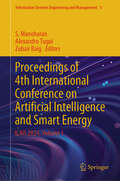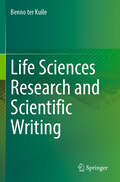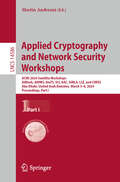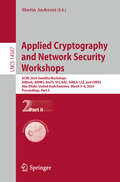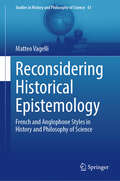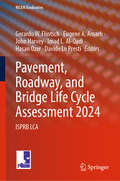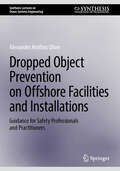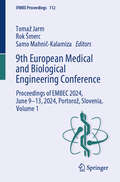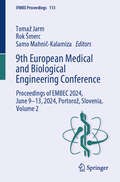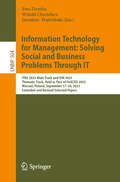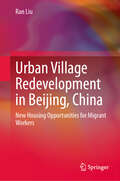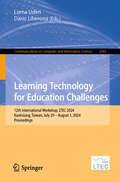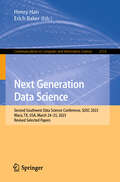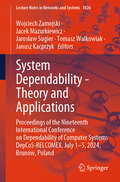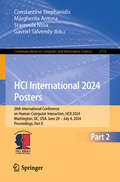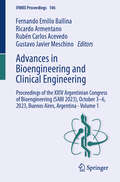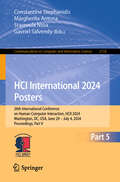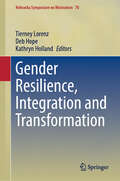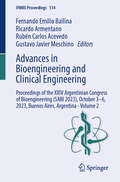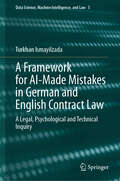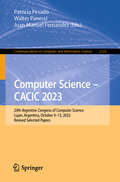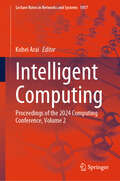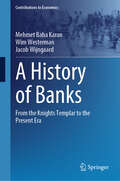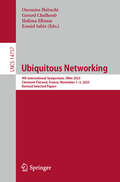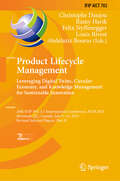- Table View
- List View
Proceedings of 4th International Conference on Artificial Intelligence and Smart Energy: ICAIS 2024, Volume 1 (Information Systems Engineering and Management #3)
by Zubair Baig Alexandru Tugui S. ManoharanThis book presents a comprehensive collection of research chapters focusing on innovative solutions to energy and sustainability challenges. It reflects the collaborative efforts of researchers worldwide, showcasing novel approaches to complex problems. Topics discussed range from securing cyber-physical systems to revolutionizing healthcare with AI and robotics, emphasizing sustainable research. The book emphasizes smart and sustainable energy solutions, highlighting advancements in solar panel efficiency, fault analysis, and fuzzy-controlled converters for grid-tied photovoltaic systems. Additionally, it explores AI's transformative potential in water solutions, agriculture, and renewable energy technologies across domains like smart cities, transportation, and healthcare. The insights shared aim to inspire further research, foster discussions, and drive real-world impact toward a resilient, inclusive, and sustainable future. · Discusses issues and offers sustainable solutions to meet the challenges faced by today's economy and industry. · Presents recent research in the sustainable transformation of engineering and technological systems. · Serves as a valuable resource for both academic researchers and industry practitioners interested in Artificial Intelligence (AI) and smart energy sectors.
Life Sciences Research and Scientific Writing
by Benno ter KuileScientific writing is a trade that can and must be learned and not a form of art that is limited to the talented. The real constraint for writing a good scientific article is most of the time not the usage of the English language, but the conversion of outcomes of a set of experiments into a coherent and convincing scientific story. This book is designed to guide junior scientists in the Life Sciences writing their thesis and first manuscripts, along this uphill struggle. All aspects of building up and publishing a forceful scientific narrative are covered, from designing experiments to dealing with the reviewers’ comments. This book takes you step by step through the process of writing a paper. It starts by discussing how to collect and organize data and make an outline. The actual writing starts with the Results section, as this is the heart of any research paper. The Discussion interprets your data in the framework of the existing literature and explains the novel insights you obtained. The Introduction is written to pose the questions that are answered in the Discussion and give the necessary background information. It is written after the Results and Discussion to make sure it is a perfect match. The M&M is the easiest to write. A good abstract is essential for attracting readers. How to write that is described in detail. The title is the last piece of the puzzle. The book contains many practical examples that explain the general principles of good writing. These examples are all from the Life Sciences and so are the anecdotes that illustrate the concepts, making the information directly applicable. All kinds of tips and suggestions are provided for improving readability and accessibility of your manuscript, thus making it easier acceptable. In addition, background information on the basics of science is supplied that helps to avoid common mistakes that cause rejection of manuscripts that report on otherwise good science.
Applied Cryptography and Network Security Workshops: ACNS 2024 Satellite Workshops, AIBlock, AIHWS, AIoTS, SCI, AAC, SiMLA, LLE, and CIMSS, Abu Dhabi, United Arab Emirates, March 5–8, 2024, Proceedings, Part I (Lecture Notes in Computer Science #14586)
by Martin AndreoniThis two-volume set LNCS 14586-14587 constitutes the proceedings of eight Satellite Workshops held in parallel with the 22nd International Conference on Applied Cryptography and Network Security, ACNS 2024, held in Abhu Dabhi, United Arab Emirates, during March 5-8, 2024. The 33 full papers and 11 poster papers presented in this volume were carefully reviewed and selected from 62 submissions. They stem from the following workshops: 6th ACNS Workshop on Application Intelligence and Blockchain Security (AIBlock 2024). 5th ACNS Workshop on Artificial Intelligence in Hardware Security (AIHWS 2024). 6th ACNS Workshop on Artificial Intelligence and Industrial IoT Security (AIoTS 2024). 5th ACNS Workshop on Secure Cryptographic Implementation (SCI 2024). 1st Workshop on Advances in Asymmetric Cryptanalysis (AAC 2024). 6th ACNS Workshop on Security in Machine Learning and its Applications (SiMLA 2024). 1st Workshop on Low-Latency Encryption (LLE 2024). 4th ACNS Workshop on Critical Infrastructure and Manufacturing System Security (CIMSS 2024).
Applied Cryptography and Network Security Workshops: ACNS 2024 Satellite Workshops, AIBlock, AIHWS, AIoTS, SCI, AAC, SiMLA, LLE, and CIMSS, Abu Dhabi, United Arab Emirates, March 5–8, 2024, Proceedings, Part II (Lecture Notes in Computer Science #14587)
by Martin AndreoniThis two-volume set LNCS 14586-14587 constitutes the proceedings of eight Satellite Workshops held in parallel with the 22nd International Conference on Applied Cryptography and Network Security, ACNS 2024, held in Abhu Dabhi, United Arab Emirates, during March 5-8, 2024. The 33 full papers and 11 poster papers presented in this volume were carefully reviewed and selected from 62 submissions. They stem from the following workshops: 6th ACNS Workshop on Application Intelligence and Blockchain Security (AIBlock 2024). 5th ACNS Workshop on Artificial Intelligence in Hardware Security (AIHWS 2024). 6th ACNS Workshop on Artificial Intelligence and Industrial IoT Security (AIoTS 2024). 5th ACNS Workshop on Secure Cryptographic Implementation (SCI 2024). 1st Workshop on Advances in Asymmetric Cryptanalysis (AAC 2024). 6th ACNS Workshop on Security in Machine Learning and its Applications (SiMLA 2024). 1st Workshop on Low-Latency Encryption (LLE 2024). 4th ACNS Workshop on Critical Infrastructure and Manufacturing System Security (CIMSS 2024).
Reconsidering Historical Epistemology: French and Anglophone Styles in History and Philosophy of Science (Studies in History and Philosophy of Science #61)
by Matteo VagelliThis book explores the key conceptual stakes underpinning historical epistemology. The strong Anglophone interest in historical epistemology, since at least the 1990s, is typically attributed to its simultaneously philosophical and historical synthetic approach to the study of science. Yet this account, considered by critics to be an unreflective assumption, has prevented historical epistemology from developing a clear understanding and definition, especially regarding how precisely historical and philosophical reflections on the sciences should be combined. Thus, this book uniquely analyses how the problems and tensions inherent to the “contemporary” phase of historical epistemology can be clarified by reference to the “classical” French phase. The archaeological method of Michel Foucault, which draws on and transforms fundamental insights by Gaston Bachelard and Georges Canguilhem, is used to exert an enduring influence on the field—especially through the work of Ian Hacking and his philosophical cum historical analyses of “styles of scientific reasoning”. Though this book is of great value to academic specialists and graduate students, the fact it addresses questions broad in scope ensures it is also relevant to a range of scholars in many disciplines and will provoke discussion among those interested in foundational issues in history and philosophy of science.
Pavement, Roadway, and Bridge Life Cycle Assessment 2024: ISPRB LCA (RILEM Bookseries #51)
by John Harvey Imad L. Al-Qadi Hasan Ozer Gerardo W. Flintsch Eugene A. Amarh Davide Lo PrestiThis book highlights the latest advances, innovations, and applications in the field of LCA in pavements, bridges, and roadways, as presented by leading international researchers at the 6th International Symposium on Pavement, Roadway, and Bridge Life Cycle Assessment (ISPRB LCA2024), held in Arlington, VA, USA, on June 6–8, 2024. It covers a diverse range of topics concerning assessment of environmental impacts of pavements, bridges, and roadways, including environmental product declarations (EPDs) and use of life cycle assessment (LCA) in design, data, and case studies: LCA methodologies for transportation infrastructure, durability and service life assessments, maintenance strategies to enhance performance and minimize environmental impacts, evaluating the environmental impacts of materials and construction, recycling and reuse of materials, carbonation of concrete, pavement vehicle interaction, life cycle thinking in climate change planning, and climate change mitigation. The contributions, which were selected by means of a rigorous international peer-review process, present a wealth of exciting ideas that will open novel research directions and foster new multidisciplinary collaborations.
Dropped Object Prevention on Offshore Facilities and Installations: Guidance for Safety Professionals and Practitioners (Synthesis Lectures on Ocean Systems Engineering)
by Alexander Arnfinn OlsenThe prevention of dropped objects is an important component of safeguarding personnel, property and the maritime environment. This concise book has been developed to provide safety professionals and practitioners with specific guidance and criteria on the development, implementation and management of dropped object prevention programs which corresponds to a growing industry-wide development to mitigate and eliminate the hazards imposed by dropped objects. This book relates to the Class requirements for an onboard dropped object prevention program to be implemented on offshore assets, and provides the design requirements for equipment primary securing, secondary retention methods and securing for specific equipment, etc. This book is intended for use by offshore installation Owners, Operators, and Companies whose intention is to prepare for, and ultimately apply for optional Class notations highlighting the installation’s compliance with dropped object safety management. For the benefit of context, the book uses the provisions which relate specifically to the DOPP and DOPP+ notations.
9th European Medical and Biological Engineering Conference: Proceedings of EMBEC 2024, June 9-13, 2024, Portorož, Slovenia, Volume 1 (IFMBE Proceedings #112)
by Samo Mahnič-Kalamiza Tomaž Jarm Rok ŠmercThis book informs on new trends, challenges, and solutions, in the multidisciplinary field of biomedical engineering. It covers traditional topics in biomechanics and biomedical signal processing, as well as recent trends relating to the applications of artificial intelligence and machine learning methods in medicine and biology, and to bioengineering education. Gathering the second volume of the proceedings of the 9th European Medical and Biological Engineering Conference (EMBEC 2024), held on June 9-13, 2024, in Portorož, Slovenia, this book bridges fundamental and clinically-oriented research, emphasizing the role of translational research in biomedical engineering. It aims at inspiring and fostering communication and collaboration between engineers, physicists, biologists, physicians and other professionals dealing with cutting-edge themes in and advanced technologies serving the broad field of biology and healthcare.
9th European Medical and Biological Engineering Conference: Proceedings of EMBEC 2024, June 9-13, 2024, Portorož, Slovenia, Volume 2 (IFMBE Proceedings #113)
by Samo Mahnič-Kalamiza Tomaž Jarm Rok ŠmercThis book informs on new trends, challenges, and solutions, in the multidisciplinary field of biomedical engineering. It covers traditional topics in biomechanics and biomedical signal processing, as well as recent trends relating to the applications of artificial intelligence and IoT in healthcare, wearable devices for patient monitoring, monitoring of medical devices, machine learning applications in medical data, among others. Gathering the second volume of the proceedings of the 9th European Medical and Biological Engineering Conference (EMBEC 2024), held on June 9-13, 2024, in Portorož, Slovenia, this book bridges fundamental and clinically-oriented research, emphasizing the role of translational research in biomedical engineering. It aims at inspiring and fostering communication and collaboration between engineers, physicists, biologists, physicians and other professionals dealing with cutting-edge themes in and advanced technologies serving the broad field of biology and healthcare.
Information Technology for Management: ITBS 2023 Main Track and ISM 2023 Thematic Track, Held as Part of FedCSIS 2023, Warsaw, Poland, September 17–20, 2023, Extended and Revised Selected Papers (Lecture Notes in Business Information Processing #504)
by Ewa Ziemba Witold Chmielarz Jarosław WątróbskiThe present book includes extended and revised versions of a set of selected papers submitted to the Topical Area of Information Technology for Business and Society, ITBS 2023, and two Thematic Tracks: Information System Management, ISM 2023, and Knowledge Acquisition and Management, KAM 2023, held in Poland, Warsaw, during September 17- 20, 2023. ITBS 2023 received 26 submissions, from which 6 full papers and 2 short papers have been accepted; for ISM 2023 3 full papers and 1 short paper have been accepted from 21 submissions; and for KAM 2023 1 full paper has been accepted from 7 submissions. From the 6 submissions to DSH 2023, no paper passed the extended reviews. The accepted papers are grouped in sections on IT in Improving of Management Systems, Approaches to Improving of Social Problems, and Methods of Solving Business.
Urban Village Redevelopment in Beijing, China: New Housing Opportunities for Migrant Workers
by Ran LiuThe book provides a multi-stage assessment of the changing housing opportunities of migrant workers in the three stages of Beijing’s urban village development (emergence, erasure and preservation). The volume re-theorizes Henry Lefebvre’s notion of the “right to the city” as a largely property-based concept that falls within the city’s hybrid tenure matrix of varying degrees of tenure security and formality that is undergoing entrepreneurialization or gentrification. This is another highly valuable contribution to China studies from the geographical perspective of the “territorial politics” at play in the process of urban village redevelopment, which has fostered a new propertied landowning class as winners, while moving low-wage migrants. The book takes the reader on a fascinating journey from peri-urban villages to IT worker villages to artists’ villages, revealing a restless landscape of urbanism and state-centered governance, as well as bottom-up counterplots. The fieldwork explores the contradictions of urban village redevelopment in Beijing. On the one hand, it is state-dominated and yet creates new housing opportunities for migrants; on the other, it disrupts old orders but also encourages new forms of grassroots alliances. The empirical studies of Beijing’s urban villages enrich Henry Lefebvre’s discourse on “planetary urbanisation,” Gilles Deleuze and Félix Guattari’s notion of the “rhizome,” and Elinor Ostrom’s ideas on the wise management of the “commons.”
Learning Technology for Education Challenges: 12th International Workshop, LTEC 2024, Kaohsiung, Taiwan, July 29 – August 1, 2024, Proceedings (Communications in Computer and Information Science #2082)
by Lorna Uden Dario LiberonaThis book constitutes the refereed proceedings of the 12th International Conference on Learning Technology for Education Challenges, LTEC 2024, held in Kaohsiung, Taiwan, during July 29–August 1, 2024. The 26 full papers included in this book were carefully reviewed and selected from 51 submissions. They were organized in topical sections as follows: serious games and virtual learning environments; learning practices and methodologies; learning technologies; learning processes and culture; e-learning and performance, and artificial intelligence and learning.
Next Generation Data Science: Second Southwest Data Science Conference, SDSC 2023, Waco, TX, USA, March 24–25, 2023, Revised Selected Papers (Communications in Computer and Information Science #2113)
by Henry Han Erich BakerThis book constitutes the refereed proceedings of the Sescond Southwest Data Science Conference, SDSC 2023, held in Waco, TX, USa, during March 24-25, 2023. The 16 full and 1 short paper included in this book were carefully reviewed and selected from 72 submissions. They were oragnized in topical sections named: Business social and foundation data science; and applied data science, artifiicial intelligence and data engineering.
System Dependability - Theory and Applications: Proceedings of the Nineteenth International Conference on Dependability of Computer Systems DepCoS-RELCOMEX. July 1–5, 2024, Brunów, Poland (Lecture Notes in Networks and Systems #1026)
by Janusz Kacprzyk Wojciech Zamojski Jacek Mazurkiewicz Jarosław Sugier Tomasz WalkowiakThis book presents a selection of papers about problems which arise in dependability studies of contemporary computer systems and networks. Their collection should be an interesting and inspiring source material for scientists, researchers, engineers, and students who must consider diverse dependability characteristics in design, analysis, or maintenance of computer systems and networks. The papers were presented during the 19th DepCoS-RELCOMEX conference which was the next event in a series organized annually since 2006. Originating as a scientific platform for discussions of reliability aspects in computer engineering, the topical scope of the conference has been constantly expanded to incorporate new dependability challenges brought by recent advances in systems and information technologies. Currently, dependable operation in the context of computer processing means obtaining reliable (true and timely) results in the conditions of processing both quantitative and qualitative data, using precise or fuzzy (often: imitating) models and algorithms. With increasing use of artificial intelligence algorithms and tools, dependability in contemporary information technology and computer engineering calls for methods based on cognitive systems and deep learning techniques. Topical variety of the papers included in these proceedings proves that almost all applications of modern computer systems and networks must take into account the aspect of dependability and also illustrates a wide diversity of multidisciplinary subjects which needs to be considered in this context.
HCI International 2024 Posters: 26th International Conference on Human-Computer Interaction, HCII 2024, Washington, DC, USA, June 29 – July 4, 2024, Proceedings, Part II (Communications in Computer and Information Science #2115)
by Gavriel Salvendy Margherita Antona Constantine Stephanidis Stavroula NtoaThe seven-volume set CCIS 2114-2120 contains the extended abstracts of the posters presented during the 26th International Conference on Human-Computer Interaction, HCII 2024, held in Washington, DC, USA, during June 29–July 4, 2024. The total of 1271 papers and 309 posters included in the HCII 2024 proceedings were carefully reviewed and selected from 5108 submissions. The posters presented in these seven volumes are organized in the following topical sections: Part I: HCI Design Theories, Methods, Tools and Case Studies; User Experience Evaluation Methods and Case Studies; Emotions in HCI; Human Robot Interaction. Part II: Inclusive Designs and Applications; Aging and Technology. Part III: eXtended Reality and the Metaverse; Interacting with Cultural Heritage, Art and Creativity. Part IV: HCI in Learning and Education; HCI in Games. Part V: HCI in Business and Marketing; HCI in Mobility and Automated Driving; HCI in Psychotherapy and Mental Health. Part VI: Interacting with the Web, Social Media and Digital Services; Interaction in the Museum; HCI in Healthcare. Part VII: AI Algorithms and Tools in HCI; Interacting with Large Language Models and Generative AI; Interacting in Intelligent Environments; HCI in Complex Industrial Environments.
Advances in Bioengineering and Clinical Engineering: Proceedings of the XXIV Argentinian Congress of Bioengineering (SABI 2023), October 3–6, 2023, Buenos Aires, Argentina - Volume 1 (IFMBE Proceedings #106)
by Ricardo Armentano Fernando Emilio Ballina Rubén Carlos Acevedo Gustavo Javier MeschinoThis book offers a timely snapshot of research, technologies and best practices in the broad area of bioengineering and clinical engineering. It reports on advances in biomechanics, biomedical image processing, biomaterials and tissue engineering. Further, it covers applications of artificial intelligence in biology and medicine, and instrumentation. Gathering the first volume of the proceedings of the XXIV Argentinian Congress of Bioengineering (SABI 2023), held on October 3–6, 2023, in Buenos Aires, Argentina - and organised by the Sociedad Argentina de Bioingeniería, this book provides an extensive source of information for both researchers and professionals in biomedical and clinical engineering.
HCI International 2024 Posters: 26th International Conference on Human-Computer Interaction, HCII 2024, Washington, DC, USA, June 29 – July 4, 2024, Proceedings, Part V (Communications in Computer and Information Science #2118)
by Gavriel Salvendy Margherita Antona Constantine Stephanidis Stavroula NtoaThe seven-volume set CCIS 2114-2120 contains the extended abstracts of the posters presented during the 26th International Conference on Human-Computer Interaction, HCII 2024, held in Washington, DC, USA, during June 29–July 4, 2024. The total of 1271 papers and 309 posters included in the HCII 2024 proceedings were carefully reviewed and selected from 5108 submissions. The posters presented in these seven volumes are organized in the following topical sections: Part I: HCI Design Theories, Methods, Tools and Case Studies; User Experience Evaluation Methods and Case Studies; Emotions in HCI; Human Robot Interaction. Part II: Inclusive Designs and Applications; Aging and Technology. Part III: eXtended Reality and the Metaverse; Interacting with Cultural Heritage, Art and Creativity. Part IV: HCI in Learning and Education; HCI in Games. Part V: HCI in Business and Marketing; HCI in Mobility and Automated Driving; HCI in Psychotherapy and Mental Health. Part VI: Interacting with the Web, Social Media and Digital Services; Interaction in the Museum; HCI in Healthcare. Part VII: AI Algorithms and Tools in HCI; Interacting with Large Language Models and Generative AI; Interacting in Intelligent Environments; HCI in Complex Industrial Environments.
Gender Resilience, Integration and Transformation (Nebraska Symposium on Motivation #70)
by Kathryn Holland Tierney Lorenz Deb HopeThere has been a surge in research on gender and sexuality in the last decade, which has predominantly focused on discrimination, dysphoria, and disparities. And much of what we hear in the news about issues relating to gender and sexuality is deeply negative, with seemingly endless attacks on people who are marginalized by their gender and/or sexuality—attacks that are both physical and political. While such issues are extremely important, this one-sided focus casts the experience of minoritized people as intrinsically negative. A deficit model implies the best one can hope for is to avoid negative outcomes, which limits the possibilities of authentic gender and sexual identity and expression, intimate connection, and personal and professional success. We need more nuanced and methodologically rigorous approaches to understanding resiliency and wellbeing within minoritized groups, including women, queer (e.g., lesbian, gay, bisexual, pansexual, asexual, demisexual), and transgender and gender diverse people. If all we ever hear about the experiences of minoritized people is pain, we diminish the strength of these communities and the richness of their humanity. When we expand our view to include the positive, we reclaim humanity—not to mention, strengthen our science by developing theories and conducting research that address the incredible range of human experience around gender and sexuality. The 70th Annual Nebraska Symposium on Motivation focused on understanding resiliency, joy, pleasure and well-being in women, queer folks and gender-diverse people. In bringing together a diverse international and interdisciplinary group of scholars and scientists, we created a space to explore joy, to break with narratives of deficiency, and honor wellbeing with the same scientific vigor and rigor as we give to pain. The chapters of this volume represent this effort, all centered on the question: What would it look like if your field of study—the study of gender and sexuality—truly centered wellbeing and resilience as the foundation of theory and research?
Advances in Bioengineering and Clinical Engineering: Proceedings of the XXIV Argentinian Congress of Bioengineering (SABI 2023), October 3–6, 2023, Buenos Aires, Argentina - Volume 2 (IFMBE Proceedings #114)
by Ricardo Armentano Fernando Emilio Ballina Rubén Carlos Acevedo Gustavo Javier MeschinoThis book offers a timely snapshot of research, technologies and best practices in the broad area of bioengineering and clinical engineering. Contributions report on advances in biomedical signal processing, biosystem models and 3D printing applications, clinical engineering, and neuromuscolar system analysis and rehabilitation engineering. They also cover developments in bioengineering education. Gathering the second volume of the proceedings of the XXIV Argentinian Congress of Bioengineering (SABI 2023), held on October 3–6, 2023, in Buenos Aires, Argentina - and organised by the Sociedad Argentina de Bioingeniería, this book provides an extensive source of information for both researchers and professionals in biomedical and clinical engineering.
A Framework for AI-Made Mistakes in German and English Contract Law: A Legal, Psychological and Technical Inquiry (Data Science, Machine Intelligence, and Law #5)
by Turkhan IsmayilzadaThis book tries to answer the question “What happens if an AI system makes a mistake while contracting?” by applying an interdisciplinary and comparative legal methodology. It offers a tantalizing glimpse into the intricate web of legal, psychological, and technical phenomena involved, and how they are interconnected within the realm of contractual mistake doctrine as we know it today. It covers a wide range of topics, including the common origins of German and English contract law, the pivotal role of intentions as a prerequisite for effectual contracts in both jurisdictions, the classification of and psychological approach to contractual mistakes, and the complexities of AI’s participation in contract law. Particular attention is paid to the juxtaposition of human- and AI-made mistakes from the perspective of information processing. As a result, the book offers a jurisdiction-agnostic framework for AI-made contractual mistakes that can aid legislators and policymakers in their deliberations on the regulation of AI in contract law. The framework considers cultural and historical differences between German and English contract law, and thus proposes an approach that can fit both (and potentially other similar) jurisdictions with minor adjustments. In addition to these novel discussions, the work explores the views of prominent scholars and international experts in the field. As such, it will appeal to researchers and scholars in the fields of law, technology, psychology, and (especially) Artificial Intelligence. By presenting “a framework for AI-made mistakes in German and English contract law,” Dr. Ismayilzada offers a valuable contribution to the field, inviting readers to explore the uncharted territory of AI and the law. Join the author on this intellectual journey and gain insights that will redefine your perception of contracts in the age of AI.
Computer Science – CACIC 2023: 29th Argentine Congress of Computer Science, Lujan, Argentina, October 9–12, 2023, Revised Selected Papers (Communications in Computer and Information Science #2123)
by Juan Manuel Fernández Patricia Pesado Walter PanessiThis book constitutes the refereed proceedings of the 29th Argentine Congress of Computer Science on Computer Science - CACIC 2023, held in Luján, Argentina, during October 9–12, 2023. The 27 full papers included in this book were carefully reviewed and selected from 142 submissions. They were organized in topical sections as follows: agents and systems; distributed and parallel processing; technology applied to education; graphic computation, images and visualization; software engineering; databases and data mining; hardware architectures, networks, and operating systems; innovation in software systems; signal processing and real-time systems; innovation in computer science education; computer security; digital governance and smart cities.
Intelligent Computing: Proceedings of the 2024 Computing Conference, Volume 2 (Lecture Notes in Networks and Systems #1017)
by Kohei AraiExplore the forefront of computing with the proceedings of the Computing Conference 2024. Featuring 165 carefully selected papers from a pool of 457 submissions, this collection encapsulates the cutting-edge research and innovation presented during the conference. Delve into a diverse range of topics, insights, and methodologies that shape the future of computing. Whether you're an academic, researcher, or enthusiast, this concise volume offers a snapshot of the dynamic and collaborative spirit defining the Computing Conference 2024.
A History of Banks: From the Knights Templar to the Present Era (Contributions to Economics)
by Mehmet Baha Karan Wim Westerman Jacob WijngaardThis book provides an overview of monetary history from the perspectives of the financial intermediaries who shaped it. Starting from the Knights Templar and ending with contemporary national banking champions, it presents several case studies that demonstrate how banks from around the world have revolutionized both their operations and the markets they operate in. The text holds a plea for democratic and transnational financial intermediation systems. It appeals to students and scholars of economic history as well as to anyone interested in the history of banking and finance.
Ubiquitous Networking: 9th International Symposium, UNet 2023, Clermont-Ferrand, France, November 1–3, 2023, Revised Selected Papers (Lecture Notes in Computer Science #14757)
by Essaid Sabir Oussama Habachi Halima Elbiaze Gerard ChalhoubThis book constitutes the refereed proceedings of the 9th International Symposium on Ubiquitous Networking, UNet 2023, held in Clermont-Ferrand, France, during November 01–03, 2023. The 14 full papers included in this book were carefully reviewed and selected from 28 submissions. They were organized in topical sections as follows: artificial intelligence-driven communications; data engineering, cyber security and pervasive services; tactile internet and internet of things; ubiquitous communication technologies and networking.
Product Lifecycle Management. Leveraging Digital Twins, Circular Economy, and Knowledge Management for Sustainable Innovation: 20th IFIP WG 5.1 International Conference, PLM 2023, Montreal, QC, Canada, July 9–12, 2023, Revised Selected Papers, Part II (IFIP Advances in Information and Communication Technology #702)
by Abdelaziz Bouras Ramy Harik Louis Rivest Felix Nyffenegger Christophe DanjouThis two-volume set IFIP AICT 701-702 constitutes the refereed post-conference proceedings of the 20th IFIP WG 5.1 International Conference on Product Lifecycle Management: Leveraging Digital Twins, Circular Economy, and Knowledge Management for Sustainable Innovation, PLM 2023, held in Montreal, QC, Canada, during July 9–12, 2023. The 61 regular papers included in this book were carefully reviewed and selected from 116 submissions. They are organized in the following thematic sections: Part I: Technology implementation: augmented reality, CPS and digital twin; organisation: knowledge management, change management, frameworks for project and service development; modelisation : CAD and collaboration, model-based system engineering and building information modeling. Part II: Circular economy: characterization, criteria and implementation; interoperability technology: blockchain, IoT and ontologies for data exchange; learning and training: from AI to a human-centric approach; smart processes: prediction, optimization and digital thread.
